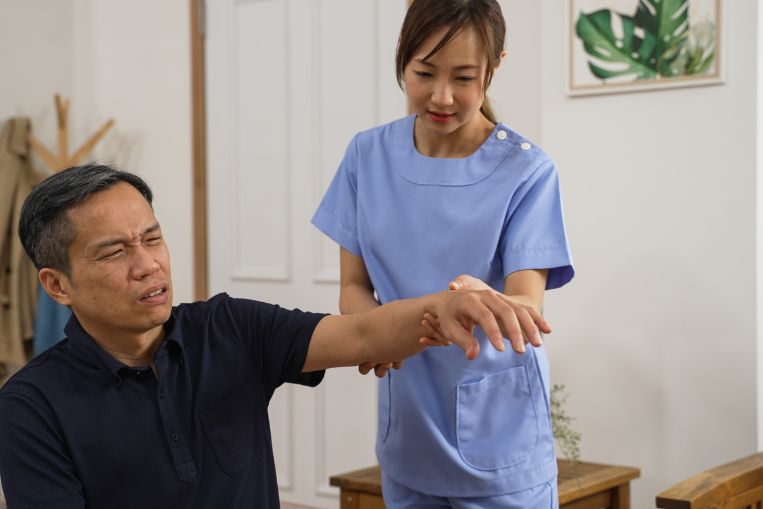Has your loved one experienced a stroke, making mobility, speech, or daily tasks difficult to perform? If you are looking for stroke treatment in Pune that can help you improve motor skills, enhance speech recovery, and support a return to your freedom, Physio9 is your go-to destination.
A stroke occurs when blood flow to the brain is interrupted, causing brain cells to die. This can lead to a range of physical, cognitive, and speech impairments. Stroke survivors often experience muscle weakness, paralysis on one side of the body, difficulty speaking, trouble with balance and coordination, and challenges in performing everyday tasks.
The effects of a stroke can vary in severity, depending on how much and which part of the brain is affected. Early intervention and rehabilitation are critical to maximizing recovery potential. At The Physio9 Clinic, we offer a comprehensive stroke treatment program that focuses on helping patients recover lost abilities and improve their quality of life.
Our stroke treatment begins with a thorough evaluation of the patient’s condition, followed by a personalized rehabilitation plan. Our team of expert physiotherapists works closely with patients to improve mobility, restore muscle strength, enhance coordination, and rebuild motor skills. We use a combination of physiotherapy exercises, strength training, balance therapy, and techniques to stimulate neuroplasticity — the brain’s ability to reorganize itself and regain function after injury.
In addition to physical rehabilitation, we focus on improving cognitive function, speech, and swallowing, helping patients relearn vital skills they may have lost. Our holistic approach ensures that patients receive both physical and emotional support throughout their recovery journey.
If your loved one is on the path to recovery after a stroke, contact The Physio9 Clinic to learn more about our stroke treatment in Pune. Our expert will guide you through this challenging journey and help you reclaim your life with confidence and strength.
FAQ's
Physiotherapy treatment for stroke focuses on helping the patient regain mobility, strength, balance, and coordination. This includes exercises to improve muscle strength, flexibility, walking, and balance. It also involves retraining movements for daily activities through techniques like passive movement, gait training, and functional training.
Physiotherapy should ideally start as soon as the patient is stable, typically within 24-48 hours after the stroke. Early intervention helps prevent complications such as muscle stiffness and joint contractures, and promotes faster recovery of lost functions.
Stroke massage therapy focuses on improving blood circulation, reducing muscle tension, and promoting relaxation in areas affected by the stroke. It may help reduce muscle stiffness, improve mobility, and enhance overall physical and emotional well-being.
Yes, many stroke survivors can live a fulfilling and independent life, but this depends on the severity of the stroke and how quickly rehabilitation starts. With the right therapies and support, stroke patients can regain a significant amount of function and adapt to any lasting changes.
Full recovery after a stroke is possible in some cases, but it depends on factors like the extent of brain damage, the location of the stroke, and how early treatment and rehabilitation begin. Many patients can achieve substantial recovery, though some may have lasting impairments.
The best treatment for stroke includes immediate medical intervention, such as clot-busting drugs (for ischemic stroke), surgery (if needed), and rehabilitation therapies like physiotherapy, speech therapy, and occupational therapy to restore lost functions.
Most strokes, especially ischemic strokes, are treated without surgery. Treatment involves medications like TPA (tissue plasminogen activator) to dissolve blood clots, blood thinners, and rehabilitation therapies to aid recovery. For hemorrhagic strokes, managing blood pressure and other factors is critical to prevent further bleeding.
While a stroke cannot be "cured" permanently, its effects can be minimized with prompt treatment and rehabilitation. Many patients can regain a significant amount of lost abilities, but lifestyle changes and ongoing care are crucial to reduce the risk of recurrent strokes.
Yes, speech can return after a stroke, but it depends on the extent of damage to the brain's language centers. Speech therapy plays a key role in helping patients regain communication abilities, using techniques to strengthen speech muscles and improve cognitive functions.
Stroke patients typically need physical therapy to improve mobility, strength, balance, and coordination. This can include gait training, strength exercises, range of motion exercises, and functional task practice to help them perform daily activities independently.







